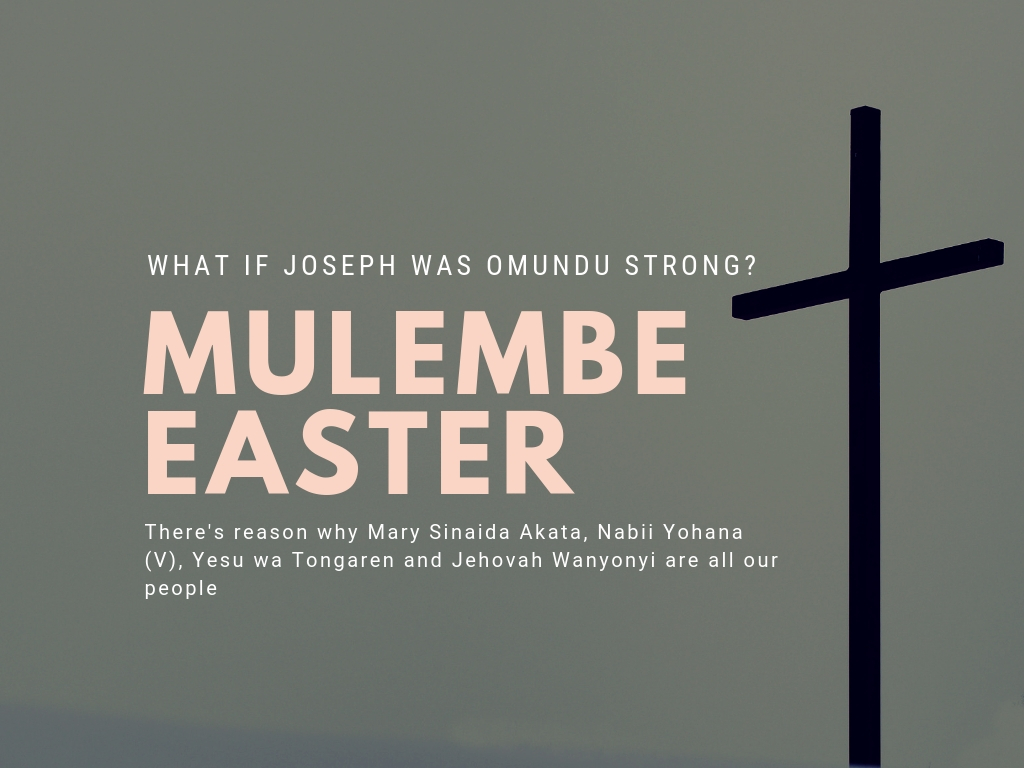Somewhere hidden among the vishigas of Vihiga, is a giant footprint of Jesus. Yes, the son of Joseph once rolled through these parts preaching mulembe, so goes the legend. If in doubt, there’s reason why Mary Sinaida Akata, Nabii Yohana (V), Yesu wa Tongaren and Jehovah Wanyonyi are all our people! It must have started from somewhere right? Well, what if Joseph the carpenter had been omundu strong? A mulembe Easter story:
The Immaculate Conception
Whenever I silently mull over — taking care not to be blasphemous — the story of Jesus’s immaculate conception, one of my secret thoughts is: ” Mary must have been good, or just too damn hot, for Joseph to buy her story.” Luckily for Mary though, she didn’t have to deal with this westernized luhya. For if Joseph was an Omundu strong from another era, Mary would have absolutely no mountain to climb.
As long as Joseph would have presented Mary as his wife, the ‘msigo’ would have become ours. Once the child passed through our ways, such as giving him a luhya name, assumption of full responsibility is happens. And if a boy, as Jesus was, once we circumcise him, he must be inherited the land upon which, by the cut of the knife of mukebi, his blood soaks on.
He must then live among his people as they now share a bond of blood. He’s become one of us by virtue of becoming a man by the same hand. The Bukusu say nobaya likhanga obayilamo chingokho. That it It is wise to raise a guinea fowl among the chickens. The sucess of Jesus (the likhanga -guinea fowl) when compared to the nondescript lives of his siblings lends credence to the wisdom of our forefathers here. Indeed, taken the other way, his siblings (the chingokho – chicken) must have been spared the indignity that Jesus suffered. That of an early death as a bachelor and with no children.
A Mulembe Easter: Other Peculiarities, Similarities and Oddities
- The only shame Joseph would have faced was: Why on coming home for the census, he and his wife had nowhere to sleep or confer. Why didn’t he have a isimba?
- Speaking of census, if Joseph was Maragoli, chances are that upon circumcision, Jesus would have been of the age set census/kuhesabiwa. Or something of the like given the interesting archival way that the Maragoli name their age sets.
- Catholic women have Mary’s difficult circumstances during the birth of Jesus as one of the seven ‘burdens’ that a woman can suffer in her lifetime. They would be pleased to know that this would also have passed in Mulembe. This is because Joseph, if he was a luhya man, would have been frowned upon for not availing necessities like food to his wife in puperium. A true luhya man prepares for the birth of his child by slaughtering an animal and preserving the meat through smoking (enyama esike) so that his wife doesn’t go hungry. He also ought to have facilitated the stocking of other needs such as water and availing a helping hand.
- The birth of Jesus, mwana amberi, would have also cemented Mary as Jospeh wife. For sons by virtue of being inheritable of ancestral land offered insurance to their mothers. Even if Joseph would have deserted Mary, when the time came and Jesus inherited land, nothing would stop him from ‘bringing his mother back’. For fathers, their insurance lies in daughters. Beacause as even in normal situations, a father can only spend a night at her daughter’s home. Never the son.
The Death of Jesus
Under any circumstances, not just in the land of Mulembe, the passion of Christ that culminated in his death, would have resulted in a death termed as unnatural. People who die through accidents, suicide, mob justice and the like undergo a different set of death and burial rituals among the luhya. For example, they would be buried at dawn before the sun rose. Or at dusk as darkness enveloped the earth.
Therefore in a mulembe Easter, the darkness that befell the world at midday after Jesus’s death on the cross would have been expected. Especially if the burial had taken place in the evening. Moreover, his burial site would have been among the bananas. Not at the center of his house or in front of it as a proper Luhya man.
Had Joseph the carpenter been a luhya, his son’s burial would have been a lackluster event. This is because Jesus had borne the clan no children. Given the luhya understanding of mourning as the last hurrah, the kushoma (mourning) of Jesus would still have been a mulembe Easter, but one that would soon be forgotten. The bull that would have been slaughtered in his honor is likely to be a candidate of a cull rather than a prized possession fell in honor of the departed man.
The Resurrection
All that’s been said above would have been common place had Jesus been just another Wafula from Kimilili, Shivachi from Shianda, Ouma from Bukhalalire or Kidiga from Mungoma. But here was a man who had become an Omwami in his own right. Meaning, given the demands of tradition, it could have gone either way for the son of Joseph. He could have been buried low-key for his stature as Jacob Juma of Mungore. Or accorded full honor by being buried seated as freedom fighter prophet Elijah Masinde.
It’s all good either way. What would have been the difference maker however would have his appearance to his disciples days after his death. That would have immediately transformed him into Bamakombe. This would have been the end of that mulembe Easter right there. For a cleansing ceremony to send the spirit back to the others would have to be conducted.

